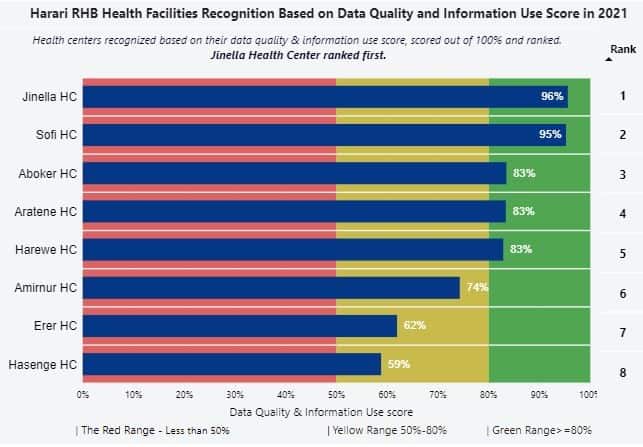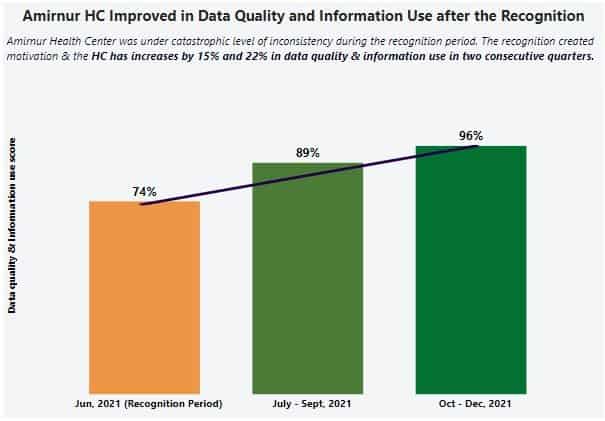Incentivizing Improved Use of Health Information at the Harari Regional Health Bureau
July 20th, 2022 | viewpoint
By Benti Ejeta
Health systems alone cannot meet the needs of a population; they require the consistent use of available high-quality data to inform decisions. With this understanding, Ethiopia’s Ministry of Health (MOH) has been enhancing its data collection processes and instilling a culture of evidence-based decision-making and program planning. Following the MOH’s footsteps, Ethiopia’s regional health bureaus (RHBs) have implemented various digital health tools and mechanisms to avail accurate, reliable, and timely data. Here is how this manifested in Harari Region.
The Ethiopia Data Use Partnership (DUP), a joint initiative between JSI Research & Training Institute, Inc. (JSI) and the MOH to implement the Information Revolution (IR) agenda (which is transforming the health data management system and data practices) and the Harari RHB reviewed the regional data quality and information use practices. The review revealed a lack of staff recognition for using high-quality data as a major determinant to staff performance. In particular, high-quality data use was not included at an important event, held as part of the annual health sector review meeting, to award high performers in various areas.
In 2021, based on the findings, DUP, with the support and funding of RHB leadership, developed the terms to establish an award category for health facility staff who use high-quality data at the regional level. “Creating consensus within the leadership for the implementation of this creative approach was the first step of a major success,” says Bethlehem Sime, program expert at Planning, Monitoring & Evaluation Directorate at the RHB.
DUP developed a criteria checklist to assess performance for data quality and information use in the region’s health facilities and administrative units. Guided by the checklist, a team of experts from the RHB and DUP conducted a rigorous assessment including document review, DHIS2 re-check, and interviews with health workers.
Jinella Health Center, one of the facilities supported by DUP, Haramaya University, and the MOH since 2019 under the Capacity Building and Mentorship Program to implement the IR, ranked first of the region’s health centers with a score of 96 percent (Figure1). In June 2021, during the annual regional health sector review meeting attended by Hafiza Bedri, deputy speaker of the Harari People Regional Council, RHB leaders, and hundreds of health workforce members, Jinella was presented with a certificate of recognition, along with a desktop computer and scanner. “Earning a ‘thank you’ from the vice president and head of the health bureau in front of their colleagues made winners feel an enormous pride. Recognition at that level and platform instilled motivation not only in them but also in those who did not make it this round,” says Fathi Mahdi Indris, deputy RHB head.

Acknowledging fine performance has been picked up at the local level, with district health offices and health facilities introducing recognition to incentivize staff data use practices. Marwan Kemal, head of Sofi Primary Health Center, notes that recognizing and celebrating accomplishments enables a health center to value and appreciate individual workers. His center aims to be a top performer in next year’s competition. During quarterly performance review meetings, Sofi leadership has started to publicly acknowledge and thank best performing staff, while bringing attention to lagging areas. “This practice has created positive competitive spirit among the staff. Evidence shows it is driving up our accomplishments in quality data use practices,” says Mr. Kemal.
Another facility that has replicated this incentive mechanism is Amirnur Health Center. Amirnur, at 74 percent, ranked sixth at the first recognition event. Six months after starting intensive implementation of the incentive program in July 2021, Amirnur had improved its quality and use of data by 22 percent (Figure 2).

Mr. Mahdi of the RHB says that the initiative has diffused down to the individual level with staff establishing a culture of thanking each other, and staff who earn ‘employee of the month’ acknowledge their colleagues’ role because they realize that improving the use and quality of information requires every team member’s effort. Mr. Mahdi notes that thinks this has created an inspiring and positive working environment in which people feel good about their contributions leads to higher productivity, and the RHB is expanding the culture and approach of recognition and incentives to private health institutions in the region through a public-private partnership. In spite of its early stage, encouraging implementation efforts are being observed.
The initiative is also motivating health facilities to find ways to creatively invest in critical infrastructure and tools for quality data collection, analysis, and use. Some raised funds from internal revenue and local events to cover the cost of internet connectivity, and the RHB, in support of the efforts, coordinated with Ethiotelecom to give most of the health centers internet access so they can exchange information online.
Fostering a cultural transformation to information use requires overcoming organizational and behavioral barriers. The Harari Region’s incentive package has improved data quality and use practices, and has seeded behavioral change at the local level that is expanding to a beneficial cultural norm.
We strive to build lasting relationships to produce better health outcomes for all.